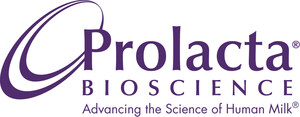Ohio Becomes First State Mandating Coverage For Inpatient And Outpatient Fortifiers
DUARTE, Calif., July 6, 2023 /PRNewswire/ -- Prolacta Bioscience®, the world's leading hospital provider of 100% human milk-based nutritional products for critically ill, premature infants, today praised the Ohio legislature for passing budget language that would provide Medicaid reimbursement for donor human milk and other donor human milk products in both inpatient and outpatient settings:
"The news is a giant win for Ohio's most vulnerable infants. Expanding reimbursement for both donor human milk and other human milk-based products will allow premature babies access to the food and nutrients that they need," said Melinda Elliott, MD, chief medical officer, Prolacta Bioscience. "Not only will Medicaid reimbursement support and improve health outcomes, but it will also save taxpayer dollars. We want to thank legislators in Ohio for doing the right thing and providing a lifeline to the very low birth weight premature babies who need it the most."
Since 2018, the Ohio Department of Medicaid (ODM) has provided inpatient and outpatient coverage for donor human milk. In FY 2019-2020, ODM provided over 33,000 ounces of donor human milk. Until today, ODM has not provided coverage for donor human milk-derived fortifiers or any other donor human milk products, which has precluded some of the neediest premature infants from consuming an exclusive human milk diet, widely recognized as the best source of nutrition.
About Prolacta's Human Milk-Based Nutritional Products
Available to hospitals since 2006, Prolacta's human milk-based fortifiers changed the standard of care for critically ill, premature infants by providing a proven alternative to cow milk-based fortifiers in the NICU.1,2,3 The naturally occurring bioactive components in human milk are thought to support infants' immunity, development, growth, and long-term health.4
Prolacta's products have the highest bioactivity in the human milk industry5 and are clinically proven to significantly boost human milk bioactive proteins and antioxidant activity.6 The company's proprietary processing ensures pathogen inactivation and the highest level of safety while retaining as much of the natural bioactivity of the milk as possible, compared to other human milk processing methods.5,7,8
About Prolacta Bioscience
Prolacta Bioscience® Inc. is a privately held, global life sciences company dedicated to Advancing the Science of Human Milk® to improve the health of critically ill, premature infants. Prolacta's 100% human milk-based nutritional products have been evaluated in more than 20 clinical studies published in peer-reviewed journals. More than 90,000 premature infants have benefited from Prolacta's nutritional products worldwide to date.9 Established in 1999, Prolacta is the world's leading provider of human milk-based nutritional products for hospital use and is also exploring the therapeutic potential of human milk across a wide spectrum of diseases. Prolacta maintains the industry's strictest quality and safety standards for screening, testing, and processing donor human milk. Operating the world's first pharmaceutical-grade human milk processing facilities, Prolacta uses vat pasteurization and a patented, FDA-reviewed manufacturing process to ensure pathogen inactivation while protecting the nutritional composition and bioactivity of its human milk-based products. Prolacta is a global company with headquarters in Duarte, California, and can be found online at www.prolacta.com, on Twitter, Instagram, Facebook, and LinkedIn.
Media Contact:
Loren Kosmont
[email protected]
310-721-9444
References
- Abrams SA, Schanler RJ, Lee ML, Rechtman DJ. Greater mortality and morbidity in extremely preterm infants fed a diet containing cow milk protein products. Breastfeed Med. 2014;9(6):281-285. doi:10.1089/bfm.2014.0024
- Cristofalo EA, et al. Randomized trial of exclusive human milk versus preterm formula diets in extremely premature infants. J Pediatr. December 2013. 163(6):1592-1595. doi: 10.1016/j.jpeds.2013.07.011.
- Sullivan S, Schanler RJ, Kim JH, et al. An exclusively human milk-based diet is associated with a lower rate of necrotizing enterocolitis than a diet of human milk and bovine milk-based products. J Pediatr. 2010;156(4):562-567.e1. doi:10.1016/j.jpeds.2009.10.040
- Gila-Diaz A, Arribas SM, Algara A, Martín-Cabrejas MA, López de Pablo ÁL, Sáenz de Pipaón M, Ramiro-Cortijo D. A review of bioactive factors in human breastmilk: a focus on prematurity. Nutrients. 2019;11(6):1307. doi:10.3390/nu11061307
- Liang N, Koh J, Kim BJ, Ozturk G, Barile D, Dallas DC. Structural and functional changes of bioactive proteins in donor human milk treated by vat-pasteurization, retort sterilization, ultra-high-temperature sterilization, freeze-thawing and homogenization. Front. Nutr. 2022;9. https://doi.org/10.3389/fnut.2022.926814
- Philip RK, Romeih E, Bailie E, et al. Exclusive human milk diet for extremely premature infants: a novel fortification strategy that enhances the bioactive properties of fresh, frozen, and pasteurized milk specimens. Breastfeed Med. April 2023;18(4):279-290. http://doi.org/10.1089/bfm.2022.0254
- Meredith-Dennis L, Xu G, Goonatilleke E, Lebrilla CB, Underwood MA, Smilowitz JT. Composition and variation of macronutrients, immune proteins, and human milk oligosaccharides in human milk from nonprofit and commercial milk banks. J Hum Lact. 2018;34(1):120-129. doi:10.1177/0890334417710635
- Lima HK, Wagner-Gillespie M, Perrin MT, Fogleman AD. Bacteria and bioactivity in Holder pasteurized and shelf-stable human milk products. Curr Dev Nutr. 2017;1(8):e001438. doi:10.3945/cdn.117.001438
- Data on file; estimated number of premature infants fed Prolacta's products from January 2007 to December 2022.
SOURCE Prolacta Bioscience

WANT YOUR COMPANY'S NEWS FEATURED ON PRNEWSWIRE.COM?
Newsrooms &
Influencers
Digital Media
Outlets
Journalists
Opted In





Share this article